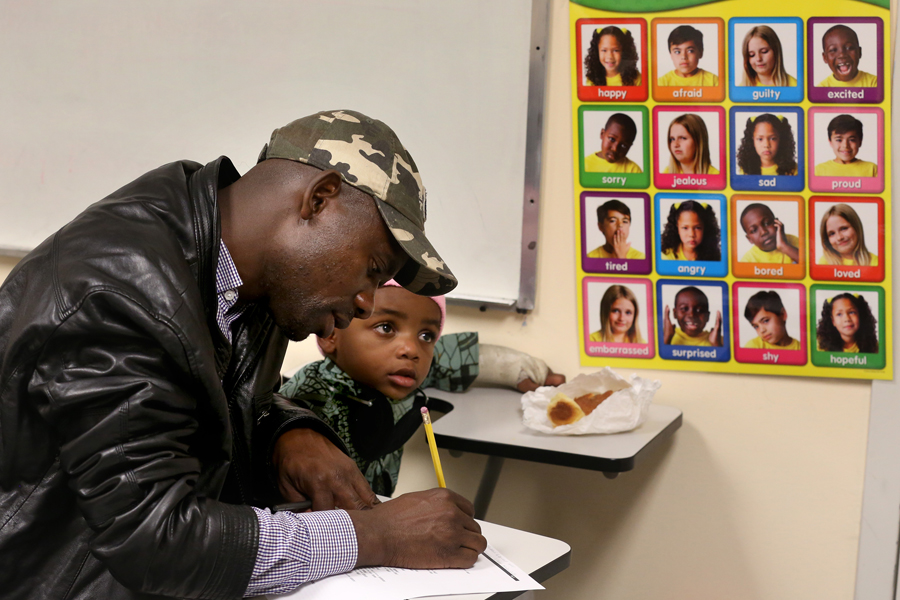After five years with RefugeeOne, assistant director of development Kim Snoddy has seen refugees from dozens of countries come to the Chicago area to start a new life.
She says about 80 percent of the resettlement organization’s staff—including its executive director, Melineh Kano, an Armenian Christian who was raised in Iran—were once refugees themselves. They’ve been through the process, and they want to help.
Since it was founded in 1982, RefugeeOne has helped people from all over the world who are fleeing unrest find new homes. The Syrian crisis, though, has been the worst in recent history. Snoddy hopes states in the U.S. won't stop accepting Syrian refugees but understands the fear some Americans have felt in light of the recent terrorist attacks in Paris.
What has been RefugeeOne’s reaction to the heated rhetoric this week surrounding the acceptance of Syrian refugees into the United States?
Initially, we were surprised because it kind of came out of nowhere. But it’s totally understandable. After seeing what happened in Paris, we understand how people can be afraid. It’s natural, and I’m sure Governor [Bruce] Rauner has heard from constituents who have voiced concerns. We understand that, and we have been cooperative with the governor’s office in his request for information regarding Syrian refugees who are scheduled to come here as well as the ones who are in the pipeline. I don’t think he is against Syrians coming here; he just wants to make sure that everyone is checked.
What sort of information has the governor’s office requested?
We only get limited information–name and age and birthdate and where they came from–and certainly we provided that information. This has just been recent. We provided some information on Wednesday and Thursday. I imagine it’s a fact-finding mission for him to see who’s coming here.
There seems to be a lot of confusion about the resettlement process. What do you think it is that people don’t know?
There needs to be a situation where the public is informed of how the process works and how secure it is. They may not know how thorough the checks are, and I think people may not understand long the process is. Even days before they get on a plane to come, they are checked again just to make sure that in any period of time they haven’t become affiliated with any terrorist groups. It’s a program that we’ve had for a very long time, and it’s been successful.
We see the refugees every day, and we hear what they’ve gone through. We’re confident, just based on past experience, that these refugees are vetted. We don’t have any fears here. We know the spirit of refugees.
What can you say about the vetting process Syrian refugees go through?
One, they don’t take your word for anything. Less than 1 percent of refugees get to be resettled in a country like the United States. It’s almost like winning the lottery. If you mess up, then you’re out. If you get here and they find out that you lied about something, they pull the trigger really quickly. It’s a very strict program. They’re very thorough.
Anything can be beat. The terrorists are getting more and more clever. Nothing is a sure thing. But you can’t live in fear. We can’t be a cocoon and not communicate with the world just because we’re afraid.
Once a family gets here, how does an organization like RefugeeOne help them resettle?
We usually get two weeks notice of when a family is going to arrive, and we find them an apartment fully furnished with everything they need because we have families that get off the plane with a backpack for a family of four. Every family has a case manager, and they help them with a variety of things depending on where they’re coming from. If you get a family from Africa, they may not have had running water or electricity, so they need to learn everything. We’ve had a 65-year-old woman who had never held a pen in her hand. They need to know how our school system works, how our health system works, and most people need help learning English.
How many Syrians has RefugeeOne helped?
I think we’ve had maybe nine or ten families. Every year, we usually resettle 500 refugees. We’ve heard that our numbers will probably go up to between 600 and 650. We don’t know how many of those will be Syrian–we can’t pick and choose who we accept. We could take more. We’re the largest resettler of refugees in Illinois and one of the larger organizations in the country.
What can you say about the Syrian families who have been resettled in Chicago?
All of the families we have resettled have been Muslim. We’ve only gotten one single man; he can barely walk without passing out, so I don’t think he’s a terrorist, either.
We did have one other young man, and he had actually been tortured. They pulled all of his toenails. I think those are the kind of people we’re seeing now. One family, there’s a widowed mother, the father was killed, and the kids have shrapnel in their bodies. Most of them have some sort of medical case, or it’s very clear that they are not ISIS. You’re not going to pull off your own toenails to come here.
They’re just like you and me, and just because of some bad luck, they had to leave their homes. It’s one of those things where you figure this could be me and what would I want.




